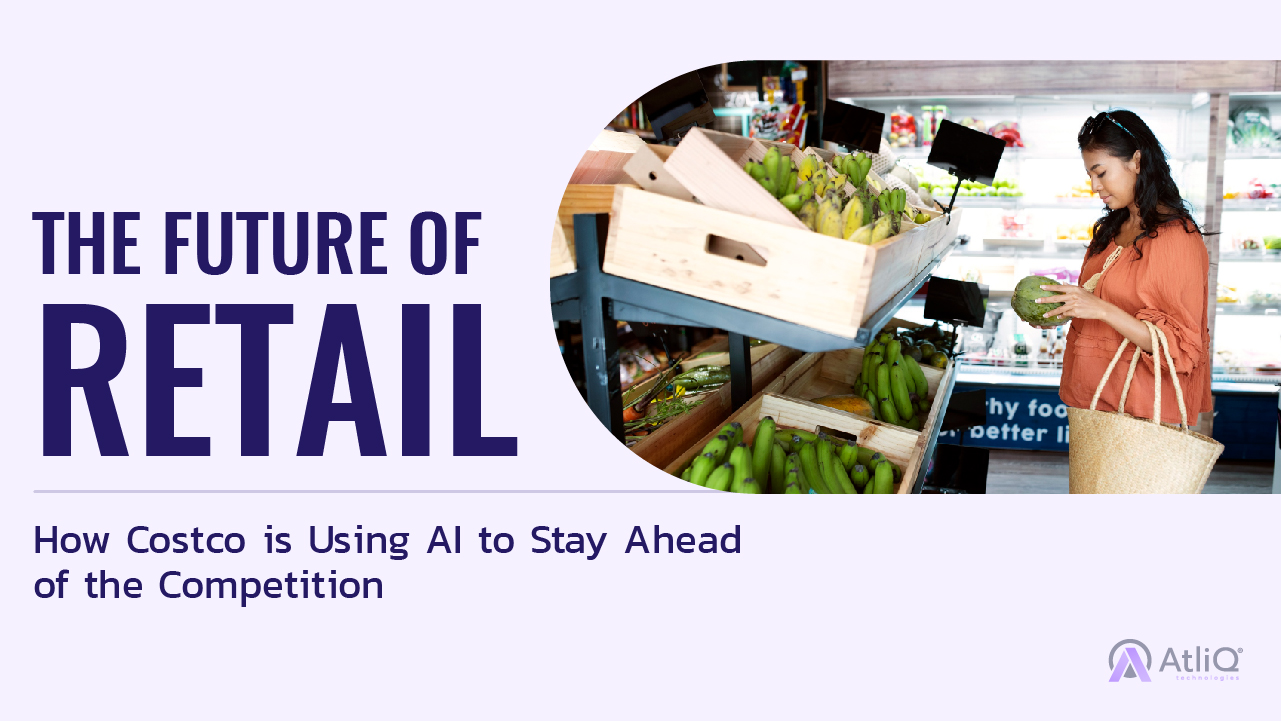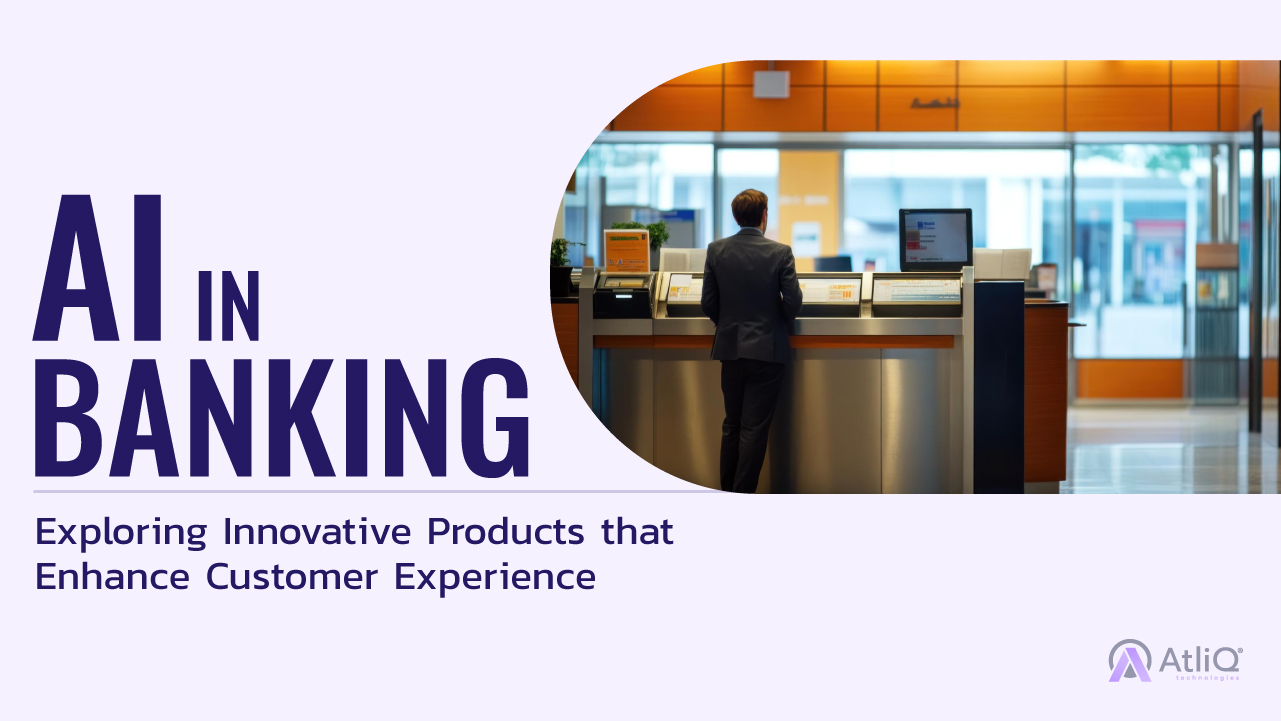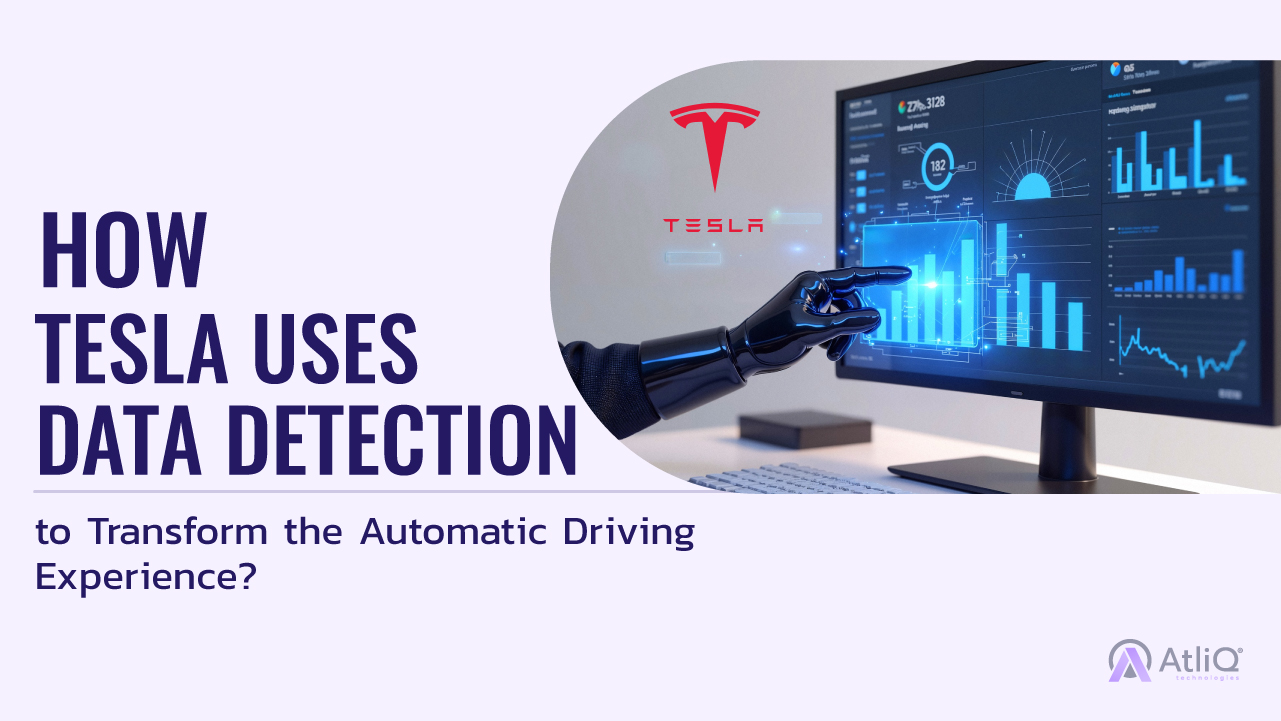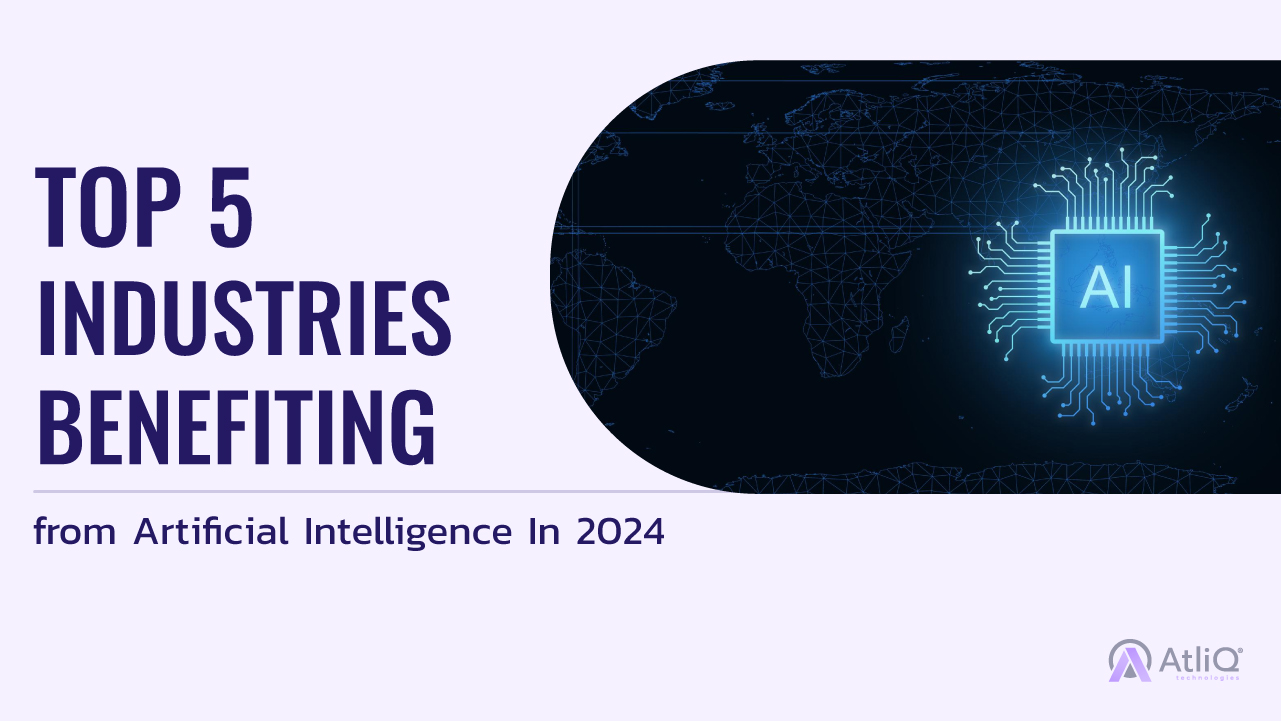
“Artificial Intelligence is the new electricity.”
This bold statement by Andrew Ng, one of the pioneers of AI, encapsulates the transformative power of this technology across various sectors. According to a report by McKinsey, AI could potentially deliver up to $5.8 Trillion annually in value across multiple industries. As AI continues to evolve, its applications are becoming indispensable for businesses looking to stay competitive.
The rapid adoption of AI across various sectors is nothing short of revolutionary. In just a few years, AI has transitioned from a futuristic concept to a driving force behind some of the most significant advancements in business and technology. From automating routine tasks to providing deep insights through data analysis, AI is becoming an essential tool for industries worldwide. In healthcare, AI is enabling faster and more accurate diagnostics, leading to better patient outcomes. The financial sector is leveraging AI for real-time fraud detection and personalized financial advice, while retail companies use AI to predict consumer behavior and manage inventory with unprecedented precision. In manufacturing, AI-driven automation is optimizing production lines and reducing waste, and in logistics, AI is streamlining supply chains and improving delivery times.
As these examples show, AI is driving a new era of innovation and growth, providing businesses with the tools they need to thrive in an increasingly competitive landscape.
Industry 1: Healthcare
Current Challenges In The Healthcare Industry
The healthcare industry faces several pressing challenges that impact both patient care and operational efficiency. High patient loads often lead to long wait times and reduced quality of care. Diagnostic errors, whether due to human oversight or insufficient data, can result in misdiagnoses and ineffective treatments. Additionally, administrative burdens, from managing patient records to navigating complex billing systems, divert valuable time and resources away from patient care.
AI Solutions That Will Benefit the Healthcare Industry
- Predictive Analytics: AI-driven tools are revolutionizing early disease detection and personalized treatment plans. By analyzing vast amounts of medical data, AI can identify patterns and predict potential health issues before they become critical. This allows for proactive interventions and personalized treatment plans tailored to each patient’s unique needs, improving overall health outcomes.
- Robotic Surgery: Robotic surgery systems, powered by AI, are enhancing surgical precision and reducing recovery times. These advanced systems offer surgeons enhanced control and accuracy, leading to less invasive procedures, shorter hospital stays, and faster recoveries for patients. AI’s role in robotic surgery also includes optimizing surgical techniques and minimizing human error.
- AI in Drug Discovery: The drug discovery process is notoriously complex and time-consuming. AI is accelerating this process by analyzing biological data to identify potential drug candidates and predict their efficacy. This speeds up the development of new medications and brings innovative treatments to market faster, addressing urgent medical needs more efficiently.
Impact of AI On The Healthcare Industry
The integration of AI in healthcare is yielding substantial benefits. Improved diagnostic accuracy and early detection of diseases lead to better patient outcomes and more effective treatments. AI-powered tools also reduce operational costs by automating administrative tasks and streamlining processes. Overall, the adoption of AI in healthcare is not only enhancing patient care but also transforming the industry into a more efficient and responsive sector.
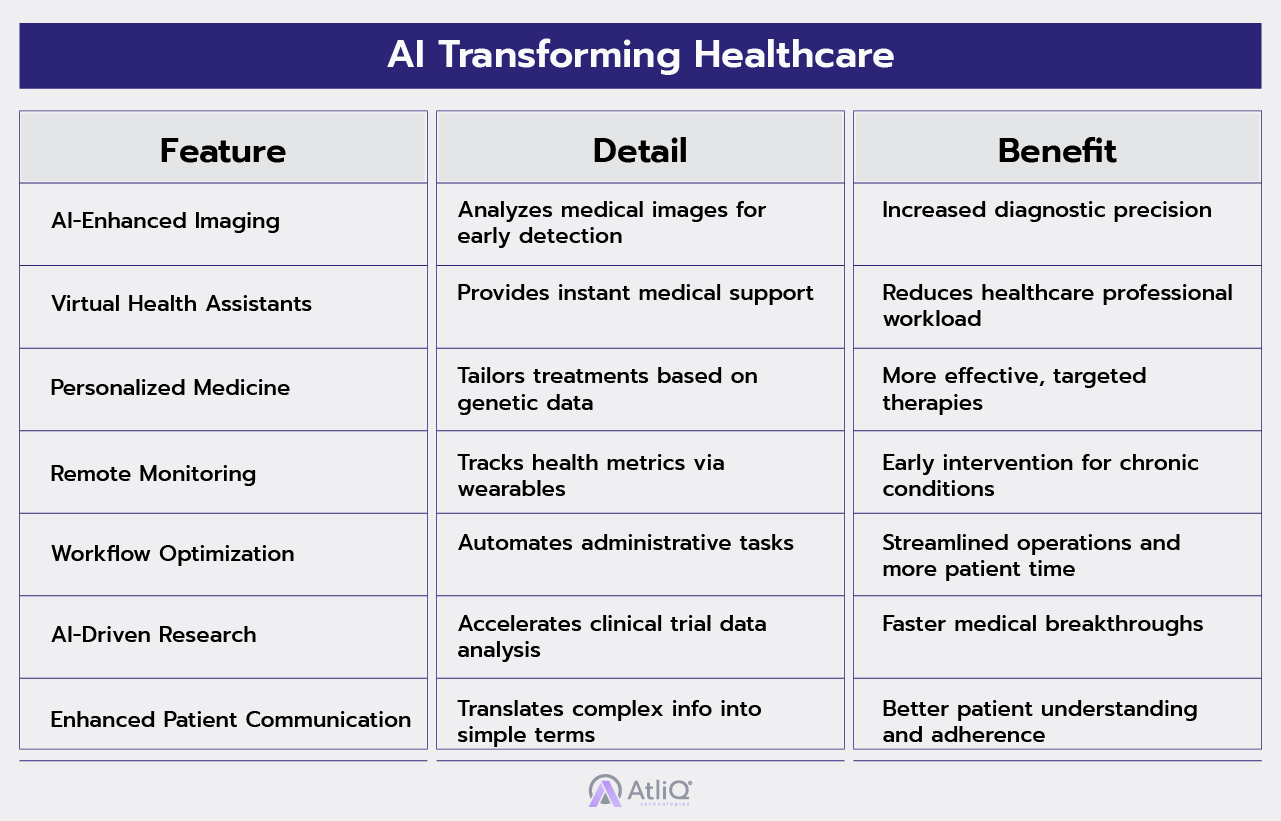
Industry 2: Financial Services
Current Challenges In The Financial Industry
The financial services sector faces several significant challenges that impact its operations and customer interactions. Fraud detection remains a critical issue, with traditional methods often falling short in identifying sophisticated fraudulent schemes. Risk management is another pressing concern, as financial institutions must constantly assess and mitigate potential risks to protect their assets and maintain stability. Additionally, customer service demands are growing, with clients expecting immediate, personalized assistance and support around the clock.
AI Solutions That Will Benefit the Financial Industry
Algorithmic Trading: AI is revolutionizing investment strategies through algorithmic trading. By analyzing vast amounts of market data in real-time, AI can make high-frequency trading decisions that optimize investment returns. These algorithms adapt to market conditions, allowing for more agile and informed trading strategies that maximize profits and reduce risks.
- Fraud Detection: AI-powered systems are enhancing fraud detection by employing advanced algorithms to spot unusual patterns and activities. These systems continuously monitor transactions and can flag potentially fraudulent behavior with a high degree of accuracy. This proactive approach helps prevent financial losses and enhances overall security for both institutions and customers.
- Customer Support: AI-driven chatbots and advisory services are transforming customer support in the financial sector. Chatbots provide instant responses to common queries, while AI-powered advisory services offer personalized financial guidance based on individual customer profiles. This not only improves the efficiency of customer service but also delivers a more tailored and satisfying experience for clients.
Impact of AI On The Financial Industry
The integration of AI in financial services is yielding substantial benefits. Increased security is achieved through advanced fraud detection systems that protect against financial crime. Better investment outcomes result from the precision and agility of algorithmic trading strategies, which optimize investment opportunities. Enhanced customer satisfaction is driven by the 24/7 availability and personalized service offered by AI-driven support systems, making financial interactions more seamless and effective. Overall, AI is elevating the financial services industry by addressing its core challenges and driving innovation.
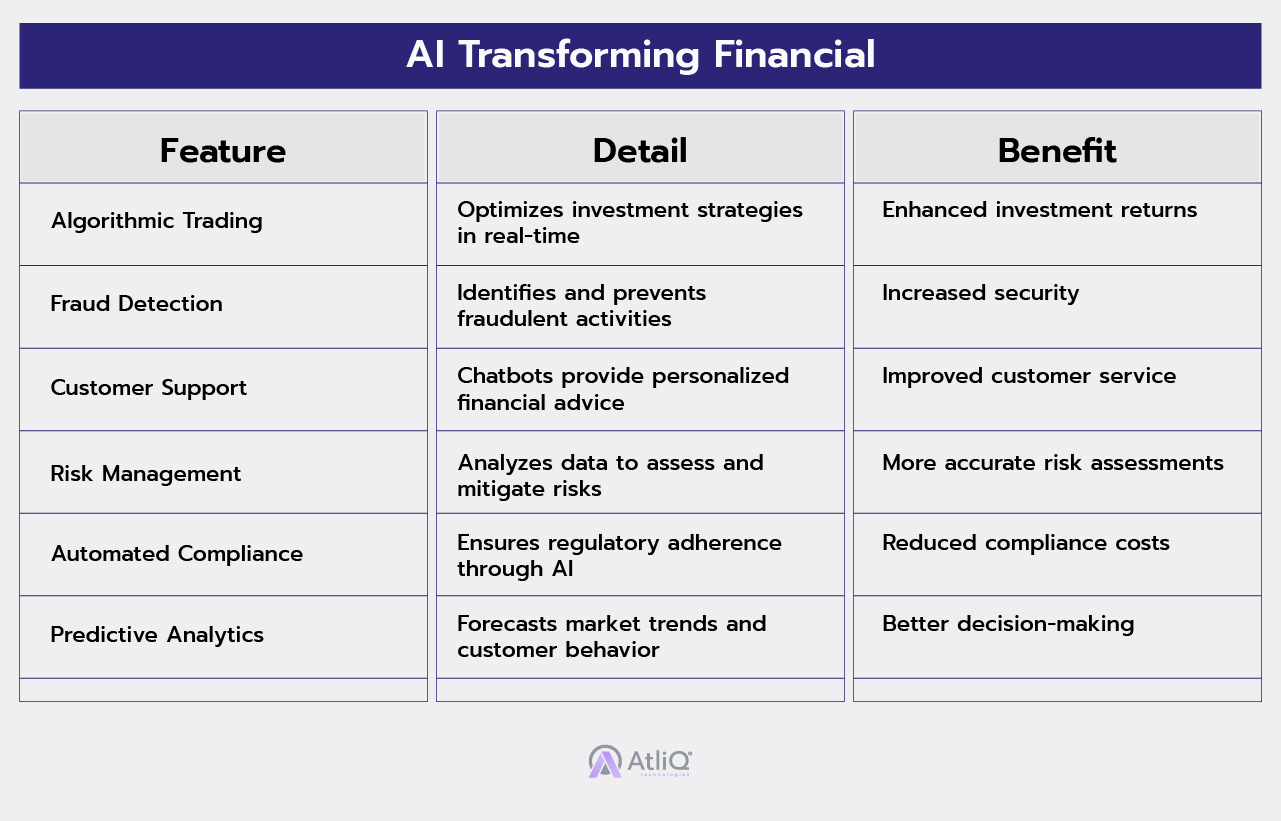
Industry 3: Retail
Current Challenges In The Retail Industry
The retail industry grapples with several key challenges that affect its efficiency and profitability. Inventory management is a constant struggle, with retailers needing to balance stock levels to meet demand without overstocking or facing shortages. Customer experience is increasingly crucial, as consumers expect personalized and seamless interactions. Additionally, supply chain inefficiencies can lead to delays, increased costs, and disrupted operations, impacting the overall shopping experience and profitability.
AI Solutions That Will Benefit the Retail Industry
- Personalized Marketing: AI is transforming retail marketing through advanced recommendation systems and targeted advertising. By analyzing customer data and purchase histories, AI can deliver personalized product recommendations and tailor advertisements to individual preferences. This leads to more relevant marketing efforts, higher conversion rates, and a more engaging shopping experience.
- Inventory Management: AI-driven predictive analytics are revolutionizing inventory management by forecasting demand with greater accuracy. These tools analyze historical sales data, market trends, and other factors to optimize stock levels, reducing both overstock and stockouts. This results in more efficient inventory turnover and better alignment with customer demand.
- Supply Chain Optimization: AI enhances supply chain management through improved demand forecasting and logistics management. By predicting future demand and optimizing delivery routes, AI helps streamline operations and minimize disruptions. This ensures timely product availability, reduces operational costs, and enhances the overall efficiency of the supply chain.
Impact of AI On The Retail Industry
The adoption of AI in retail brings significant benefits. Higher sales are achieved through personalized marketing that attracts and retains customers. Reduced waste results from optimized inventory management, minimizing excess stock and related costs. Improved customer loyalty stems from enhanced shopping experiences and efficient supply chain operations, leading to greater satisfaction and repeat business. Overall, AI is driving a new era of retail excellence, addressing core challenges and delivering a competitive edge.
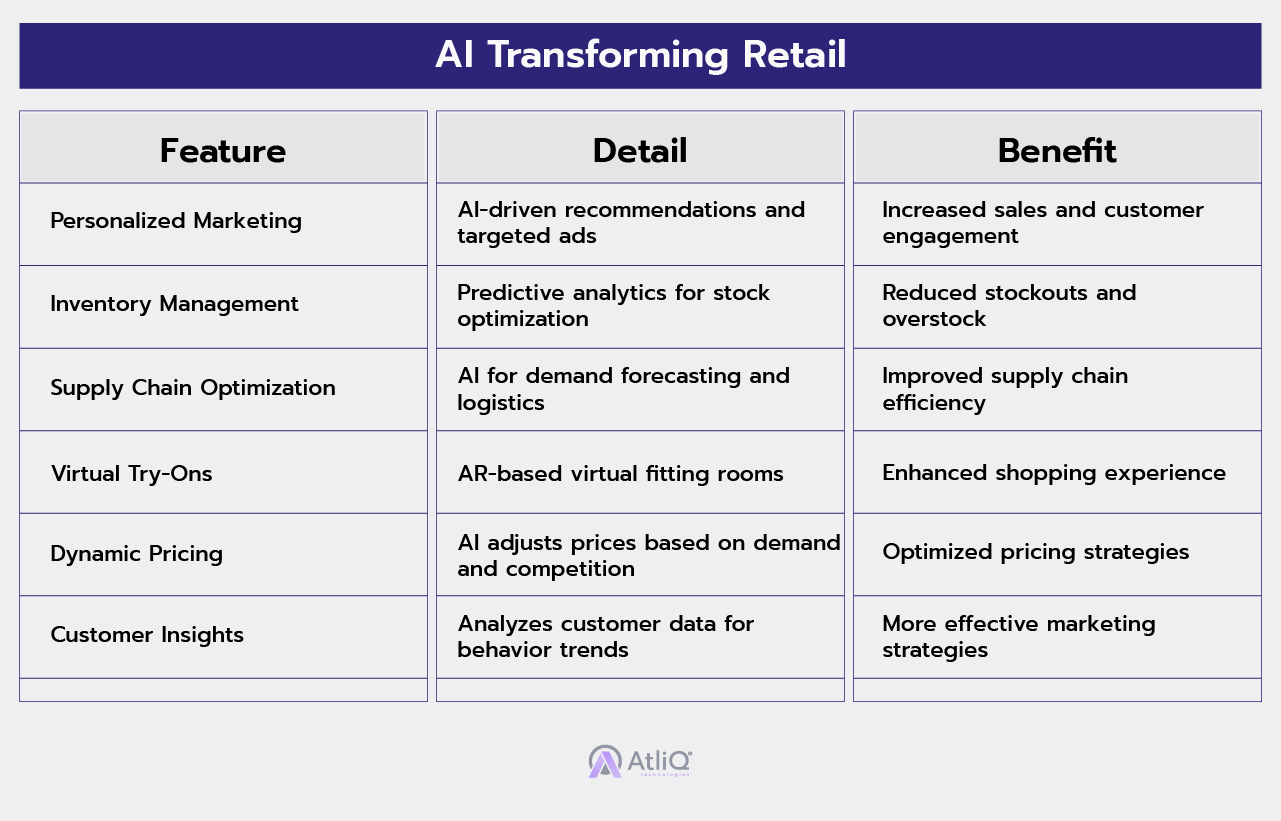
Industry 4: Manufacturing
Current Challenges In The Manufacturing Industry
The manufacturing sector is confronted with several critical challenges that impact its efficiency and product quality. Production inefficiencies often arise from outdated processes and equipment, leading to wasted resources and increased costs. Quality control is another major concern, as ensuring consistent product standards can be difficult and labor-intensive. Additionally, equipment maintenance presents a challenge, with unexpected machinery breakdowns causing costly downtime and disruptions in production.
AI Solutions That Will Benefit the Manufacturing Industry
Predictive Maintenance: AI is transforming equipment maintenance through predictive analytics. By analyzing data from machinery and sensors, AI can predict potential breakdowns before they occur. This allows manufacturers to schedule maintenance proactively, minimizing unplanned downtime and extending the lifespan of equipment. Predictive maintenance helps avoid costly repairs and ensures smoother, uninterrupted production processes.
- Quality Control: AI-driven inspection systems are revolutionizing quality control by detecting defects in real-time. These systems use advanced imaging and machine learning algorithms to inspect products as they are produced, identifying inconsistencies and defects with high precision. This leads to improved product quality and reduced waste, as defective items can be addressed promptly before reaching the customer.
- Process Automation: AI-powered robotics are streamlining manufacturing operations by automating repetitive and complex tasks. From assembly lines to packaging, AI-driven robots enhance operational efficiency and consistency. This automation reduces human error, accelerates production processes, and lowers labor costs, leading to more efficient and effective manufacturing operations.
Impact of AI On The Manufacturing Industry
The integration of AI in manufacturing yields substantial benefits. Reduced downtime is achieved through predictive maintenance, which minimizes unexpected equipment failures and keeps production running smoothly. Enhanced product quality results from AI-driven quality control systems that ensure high standards and reduce defects. Optimized production lines are realized through process automation, which improves efficiency, reduces costs, and boosts overall productivity. AI is thus driving a significant transformation in manufacturing, addressing key challenges and delivering substantial operational improvements.
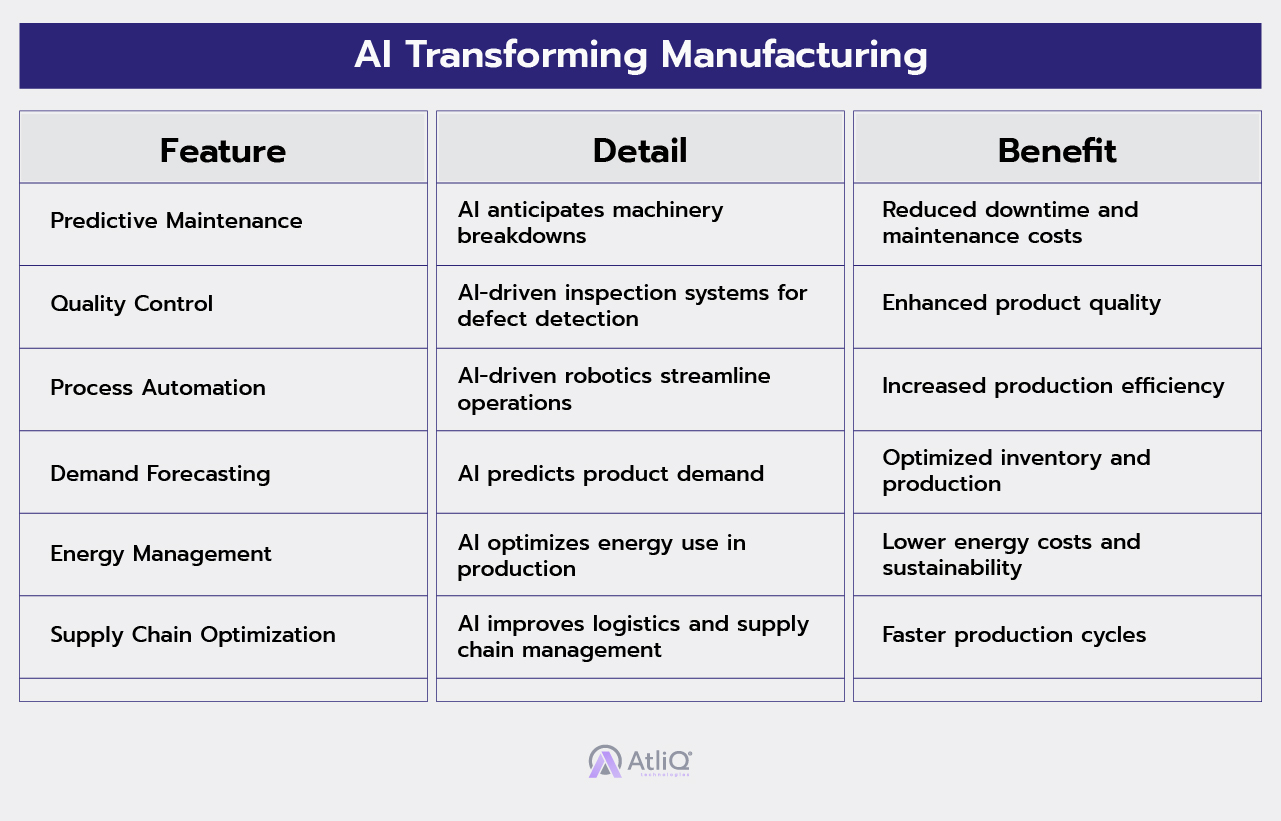
Industry 5: Transportation & Logistics
Current Challenges In The Transportation & Logistics Industry
The transportation and logistics industry faces several key challenges that impact its efficiency and effectiveness. Route optimization remains a complex task, as determining the most efficient delivery routes is crucial for minimizing fuel consumption and meeting delivery deadlines. Fuel efficiency is a major concern, with rising fuel costs and environmental regulations driving the need for better management. Additionally, cargo tracking presents difficulties in ensuring real-time visibility and accurate information about shipments.
AI Solutions That Will Benefit the Transportation & Logistics Industry
- Autonomous Vehicles: AI is revolutionizing the transportation sector with the development of self-driving trucks and delivery systems. These autonomous vehicles utilize advanced AI algorithms and sensor technology to navigate roads, manage traffic, and handle deliveries with minimal human intervention. This innovation promises to enhance efficiency, reduce labor costs, and improve safety by minimizing human error.
- Route Optimization: AI algorithms are transforming route optimization by analyzing various factors such as traffic patterns, weather conditions, and road closures. By identifying the most efficient delivery routes, AI helps reduce travel times and fuel consumption. This not only lowers operational costs but also improves overall delivery performance and customer satisfaction.
- Predictive Analytics: AI-driven predictive analytics is optimizing fleet management and demand forecasting. By analyzing historical data and current trends, AI can forecast future demand, allowing companies to adjust their fleet size and deployment strategies accordingly. This helps ensure that resources are allocated efficiently, reducing idle time and maximizing operational efficiency.
Impact of AI On The Transportation & Logistics Industry
The adoption of AI in transportation and logistics brings significant benefits. Reduced operational costs are achieved through improved route optimization and fuel efficiency. Faster delivery times result from more efficient routing and autonomous vehicle technology, enhancing customer satisfaction. Improved safety is a key benefit of autonomous vehicles, which reduce the risk of human error and accidents. Overall, AI is driving a new era of efficiency and innovation in transportation and logistics, addressing core challenges and delivering substantial improvements.
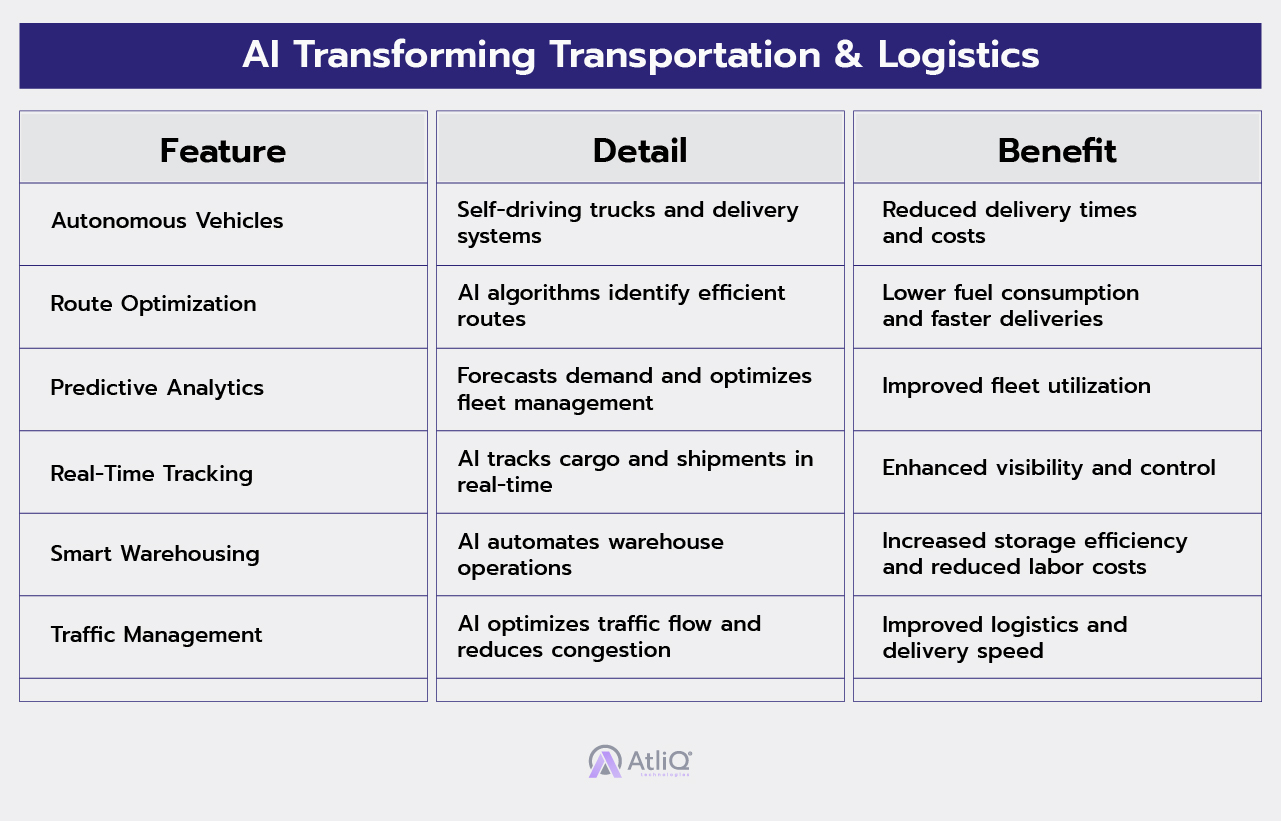
The rapid integration of Artificial Intelligence across various industries is ushering in a new era of innovation and efficiency. From healthcare and financial services to retail, manufacturing, and transportation and logistics, AI is addressing long-standing challenges and unlocking new opportunities for growth and improvement.
As AI technology continues to evolve, its impact across these sectors is expected to grow even more profound. Embracing AI offers businesses a competitive edge, enabling them to tackle current challenges effectively and seize new opportunities. By harnessing the power of AI, industries can drive innovation, improve operational efficiency, and deliver superior experiences to their customers. The future is bright for those who adapt and leverage AI’s transformative potential.
